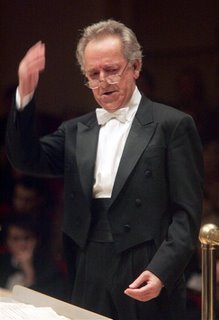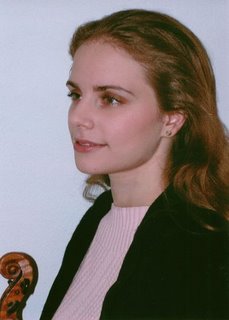 Is the region saving up its best musical events for last? In a season that was less exciting across the board than 2004/2005, we just heard the finest opera performance in The Turn of the Screw – and the Baltimore Symphony Orchestra’s current string of concerts with German violinist Julia Fischer delivered easily this season’s best violin concerto performance. It all seems to bode well for the remaining highlights, Kurt Masur’s all-Beethoven concert with the NSO next Thursday and the two Mahler performances of the BSO and NSO the week thereafter.
Is the region saving up its best musical events for last? In a season that was less exciting across the board than 2004/2005, we just heard the finest opera performance in The Turn of the Screw – and the Baltimore Symphony Orchestra’s current string of concerts with German violinist Julia Fischer delivered easily this season’s best violin concerto performance. It all seems to bode well for the remaining highlights, Kurt Masur’s all-Beethoven concert with the NSO next Thursday and the two Mahler performances of the BSO and NSO the week thereafter.First things first: Yuri Temirkanov was back after a prolonged (well over half a year), protracted stay in St. Petersburg that apparently included post-Soviet tales of embezzlement, the Russian Mafia, and firing the St. Petersburg Philharmonic’s corrupt administration. (Read Tim Smith’s article in the Baltimore Sun.) He jumped onto the rostrum and, as if possessed, with fresh and raw energy, dove into Carl Maria von Weber’s ebullient Overture to Euryanthe. One got the idea that the BSO might have missed their outgoing music director. The music is itself the utmost of charming Romanticism – light but never smacking of the facile quality that befalls even greater composers (Mendelssohn comes to mind) every once in a while. Expanding from chamber-like moments to the broad and expansive sounds of the, now expanded, explosive opening, this is the kind of music that would charm anyone’s socks off. The BSO didn’t treat it like a throw-away prelude, either but played with zest and great engagement.
 Julia Fischer is not one of the teeny-superstars of the violin like, say, Nicola Benedetti or Hilary Hahn, a few years back. For one, Ms. Fischer, born in 1983, is not a teenager. But more importantly, she is building her career judiciously, step by step with great care, some well-applied self-restraint, and what seems an immaculate intellectual grasp. If her bio and recordings (on the audiophile label Pentatone) had not proven it by now, this concert did: she is not a violinist, she is a musician.
Julia Fischer is not one of the teeny-superstars of the violin like, say, Nicola Benedetti or Hilary Hahn, a few years back. For one, Ms. Fischer, born in 1983, is not a teenager. But more importantly, she is building her career judiciously, step by step with great care, some well-applied self-restraint, and what seems an immaculate intellectual grasp. If her bio and recordings (on the audiophile label Pentatone) had not proven it by now, this concert did: she is not a violinist, she is a musician.Equipped with a prodigious technique (itself being nothing special in these days of violin-athletes), she strikes a marvelous balance between the impressive intellectualism of her senior German violinist colleagues Christian Tetzlaff, Thomas Zehetmaier, and Frank Peter Zimmerman and lyrical élan (well displayed by Hilary Hahn). Her teacher, Ana Chumachenko, may have had a hand in this; the same teacher has also brought us Arabella Steinbacher, another rising violinist from Munich whose career and style are not too dissimilar. (I’ve probably not heard enough of either in concert to truly compare – but from what I have heard, I come away with the impression that Ms. Fischer tends towards the pristine while Ms. Steinbacher is more likely to ‘get dirty’ playing a particular work.)
J. S. Bach, Sonatas & Partitas Glazunov, Khachaturian, Prokofiev, Violin Concertos W. A. Mozart, Violin Concertos |
Cutting a dashing figure in a very red dress as she did, it was not enough to detract from the sternly delicate, searing Largo, where she made the otherwise middle-of-the run, broad rendition of the work sound very special; nuances well placed called attention to the music, not her. Grace and purity abounded. Under Temirkanov’s caring hands – here was something he visibly cherished doing – the BSO performed this and the cadenza-linked last movement splendidly, even with delicacy when called upon to do so. The ripping finale topped it all off in great style. This was an example of 45 minutes of music-making as it should be – and the audience sensed it: the longest standing ovation and sustained applause (did anyone at all sneak out into intermission?) I have witnessed at Meyerhoff Hall forced an encore out of her: Paganini’s Caprice No. 2 in B Minor; delicately sawed out of the musical material if perhaps not ideally prepared. Secretly, I had hoped for some of her Bach.
Joe Banno, A Violinist of Promise and Polish (Washington Post, May 27) Tim Smith, Temirkanov's return was worth the wait (Baltimore Sun, May 27) Charles T. Downey, Julia Fischer Gets In On It (DCist, May 27) |
Anyone looking for particular sense in the way these divergent themes play off or against each other would do better to give up and enjoy the onslaught before the music is over. The symphony does not ask to be understood, it asks to be felt. Especially the haunting Lento, where there is respite found in (hollow?) beauty, a beauty not far from the second movement of the Ravel piano concerto, actually. And with Temirkanov once more leading something dear to his heart, the BSO following most every step of the way, it did make itself felt. A fine nightcap after one of the best Beethoven performances I have heard. So good, indeed, that I shall try to go again today. The third performance, as part of the “Casual Concert” series and without the Shostakovich, will be given on Saturday at 11AM.